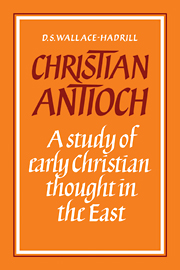Book contents
- Frontmatter
- Contents
- Foreword
- Abbreviations
- Introduction: survey of the history of Antioch
- 1 The religious background to Antiochene Christianity: pagan, Jewish, gnostic
- 2 The interpretation of the biblical record
- 3 Historiography in the Eastern Church
- 4 The doctrine of the nature of God
- 5 The use of Greek philosophy by the Eastern Church
- 6 The human experience of Christ and the salvation of man
- 7 Antiochene theology and the religious life
- Appendix 1 Eastern representation at Nicaea
- Appendix 2 The feminine element in Syrian Christianity
- Notes
- Bibliography
- Index
4 - The doctrine of the nature of God
Published online by Cambridge University Press: 03 May 2010
- Frontmatter
- Contents
- Foreword
- Abbreviations
- Introduction: survey of the history of Antioch
- 1 The religious background to Antiochene Christianity: pagan, Jewish, gnostic
- 2 The interpretation of the biblical record
- 3 Historiography in the Eastern Church
- 4 The doctrine of the nature of God
- 5 The use of Greek philosophy by the Eastern Church
- 6 The human experience of Christ and the salvation of man
- 7 Antiochene theology and the religious life
- Appendix 1 Eastern representation at Nicaea
- Appendix 2 The feminine element in Syrian Christianity
- Notes
- Bibliography
- Index
Summary
The sixth-century historian Barhadbešabba of 'Arbaya opens the third chapter of his History with an identification of two main groups of heretic: first, those who ‘offended against the economy of our Saviour in saying that he did not take flesh, but that he appeared by an illusion, such as Simon, Menander, Cerinthus, Valentinus, Cerdo, Basilides, Mani, Marcion’; and secondly those who ‘committed a great error concerning the divine nature’. He names Theodotion, Artemon, Paul of Samosata, Photinus, Arius, Eunomius, Aetius, Macedonius, who say ‘that the Word is a creature and a work (of the Father), who by grace became God, and who do not confess that he is of an (eternal) essence, but teach foolishly that he was created before all’. It may be thought curious that a Nestorian should identify the threat to ‘the economy of our Saviour’ as residing in the gnostics rather than in Monophysites of more recent date, but in his identification of two great matters of doctrinal definition, the nature of Jesus Christ and the nature of the Godhead, as the main issues to concern a sixth-century historian, he brings to the forefront the two matters of dispute which had exercised the best minds of the Church from early centuries. These two doctrines affected Syrian Christianity in different ways. The doctrine of the nature of God, which Barhadbešabba places second, was the first to become a matter of concern, and it is to that doctrine that we turn first.
- Type
- Chapter
- Information
- Christian AntiochA Study of Early Christian Thought in the East, pp. 67 - 95Publisher: Cambridge University PressPrint publication year: 1982

